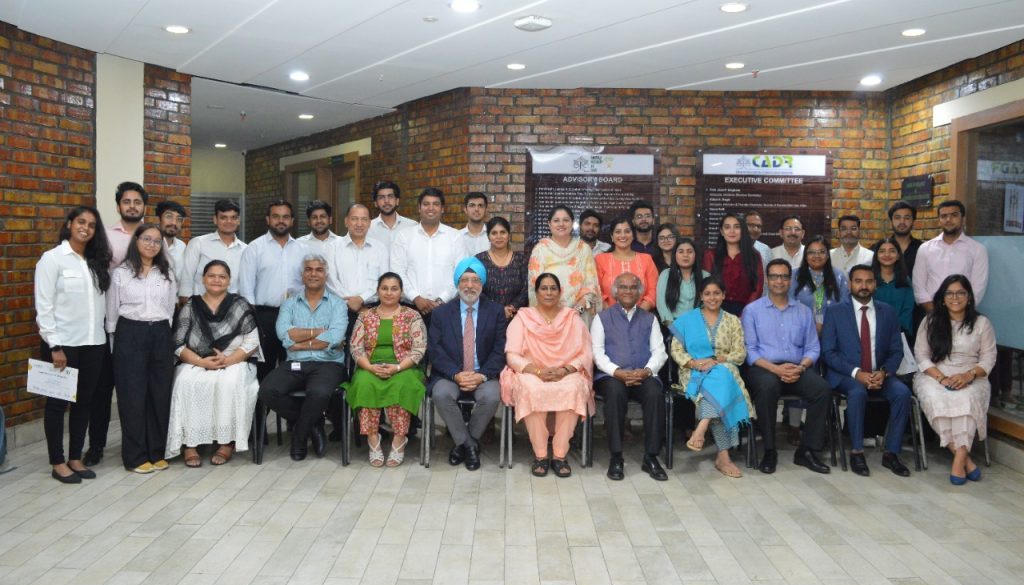CADR, School of Law, Manav Rachna University, organized a 45-hour Mediation Training Workshop in collaboration with SAMADHAN
The Centre of Excellence on Alternative Dispute Resolution (CADR), School of Law, Manav Rachna University, organized a 45-hour Mediation Training Workshop in collaboration with SAMADHAN (Delhi High Court Mediation and Conciliation Centre) in August/September 2022. The event was conducted for six days in full-day sessions.
Manav Rachna University invited five renowned resource persons from SAMADHAN, engaged the participants throughout the six days, and imbibed core values of mediation.
Mr. J.P. Sengh, Senior Advocate, a well-known civil and commercial arbitration lawyer, accomplished Mediator, and founder of Organizing Secretary of SAMADHAN, addressed the students. He said, “Mediation allows face-saving, thereby allowing parties to settle even at a later stage in the dispute.”
Ms. Veena Ralli, Senior Advocate, Advocate in the Delhi High Court. Current Organising Secretary of SAMADHAN and leads more than 250 empanelled mediators in Delhi High Court, having conducted the maximum number of mediations and the maximum number of settlements. She explained the intricacies of dispute and quoted, “Mediation is the only dispute resolution process that allows conflicting parties to maintain cordial relationships even after the dispute has arisen.”
Ms. Swati Setia, Advocate, Advocate on Record, and trained Mediator, aided students in understanding the stages of mediation.
Mr. Sumit Chander, Advocate, a practicing lawyer at Delhi High Court and a trained mediator, pursued an advanced mediation training program at Pepperdine University, California, USA. He helped students to cognize the mediation concepts through practical exercises.
Ms. Mitali Gupta, Advocate, Advocate at the High Court of Delhi. She is Accredited in Commercial Mediation by the Indian Institute of Corporate Affairs. She said, “The Mediation Bill, which was discussed in the previous winter session of the parliament, is going to change the mediation landscape of India. It will strengthen the entire mediation eco-system of the country and create several new opportunities.”
The first day of the event started with a general discussion about understanding the concepts of mediation, the difference between the judicial process and ADR, plus the relevance of Section 89 of the Code of Civil Procedure. The mediation landscape in India was discussed through historical perspectives and legislative and judicial approaches. Students understood causes and sources of conflict in the context of mediation were understood through the conflict ladder.
Manav Rachna believes in the overall understanding of the subject; thus next day dwelled on the mediation philosophy. The students understood the classical mediation process consisting of introduction & information gathering, clarification, construction, and resolution. Also, six stages of the mediation process and four essential ingredients were discussed.
The concept of negotiation was introduced on the third day and steered negotiation exercises based on negotiating styles. Also, in the workshop, different concepts revolving around bargaining were explained.
Communication has been an integral part of mediation; this topic was focused on the fourth day of the Mediation Training Workshop. Types of communication (verbal and non-verbal) and the importance of body language were discussed. Various Mediation techniques like active listening, summarizing, reframing, paraphrasing, acknowledging, deferring, directing, setting the atmosphere, and setting a plan were explained. The importance of asking the right questions and questioning skills were taught. Additionally, concepts of BATNA, WATNA, and reality testing were introduced.
Participants have imparted knowledge on questioning skills and were practiced through role play. On the mediation program’s final day, the Mediator’s role, parties, third parties, and lawyers were discussed.
The workshop enabled participants to acquire a comprehensive understanding of mediation concepts that need to be used, keeping in view the requirements of Section 89 of CPC and other statutory enactments requiring mediation as an effective tool for dispute resolution. Trainers focused on teaching and equipping the student with various mediation techniques which would benefit them in dealing with intricate issues while dealing with conflicting parties. The program imparted all necessary skills and techniques to the participants for conducting mediation. The training blended theory and practice and was designed to have active participation.



